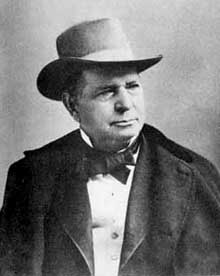- Oliver Fisher Winchester
Infobox Person
name = Oliver Fisher Winchester

image_size =
caption = Winchester circa 1847
birth_date =November 30 ,1810
birth_place =Boston
death_date =December 11 ,1880
death_place =New Haven, Connecticut
occupation =Winchester Repeating Arms Company
spouse = Jane Ellen Hope
parents = Samuel Winchester
Hannah Bates
children = Ann Rebecca Winchester (1835-1864)
William Wirt Winchester (1837-1881)
Hannah Jane WinchesterOliver Fisher Winchester (
November 30 ,1810 –December 11 ,1880 ) was an Americanbusinessman andpolitician .Birth and marriage
He was the son of Samuel Winchester and Hannah Bates and was born in
Boston onNovember 30 ,1810 . He married Jane Ellen Hope in Boston onFebruary 20 ,1834 . Their children were:
* Ann Rebecca Winchester (1835-1864) who married Charles B. Dye
*William Wirt Winchester (1837-1881) who marriedSarah Lockwood Pardee
* Hannah Jane Winchester who married Thomas Gray BennettCareer
Winchester was known for manufacturing and marketing the Winchester
repeating rifle , which was a much re-designed descendant of theVolcanic rifle of some years earlier. Winchester started as a clothing manufacturer inNew York City andNew Haven, Connecticut . During this period he discovered that a division of Smith & Wesson firearms was failing financially with one of their newly patented arms. Having an eye for opportunity, Winchester assembled venture capital together with other stockholders and acquired the S&W division, better known as the Volcanic Repeating Arms Company, in 1850. By 1856, Winchester had positioned himself as the principal stockholder in the company and relocated to New Haven, changing the name to New Haven Arms Company.Initially, the company was plagued by sluggish returns, which was in part attributed to the design and poor performance of the Volcanic cartridge: a hollow conical ball filled with black powder and sealed by a cork primer. Although the Volcanic's repeater design far outpaced the rival technology, the poor performance and reliability of the .25 and .32 caliber cartridges used in the pistol and rifle models respectively, was little match for the competitors' larger calibers.
Fortunately for Winchester, he inherited a brilliant engineer,
Benjamin Tyler Henry , who would prove an invaluable asset. Henry sought to improve on the Volcanic repeating rifle, by enlarging the frame and magazine to accommodate seventeen of his newly redesigned, all-brass case, .44 caliber rimfire cartridges. This new cartridge put the new company on the map, and Henry's ingenuity was rewarded with a patent in his nameOctober 16 ,1860 , for what was to become the famousHenry rifle .The Henry Rifle was manufactured for almost six years with a total production of approximately 12,000 rifles, both iron and brass frame models. Following the success of the Henry rifle, the company was reorganized once more and renamed the Winchester Repeating Arms Company. In 1866, employee Nelson King's new improved patent remedied flaws in the Henry rifle by incorporating a loading gate on the side of the frame and integrating a round sealed magazine which was covered by a fore stock. The first Winchester rifle was the Model 1866, the Yellow boy.
Repeating rifles were used to some extent in the
American Civil War . However, theUnited States Army at that time did not use many repeating rifles as it was a new, untested technology. Repeating rifles were not widely used until after the war, when they became increasingly popular with civilians. Military authorities concentrated primarily on perfecting breech-loading single shot rifles for many more years. With thousands of rifles in the hands of the average pioneer, the Winchester repeating rifles gained a reputation as "the gun that won the West".Oliver Winchester was also active in politics, serving as a New Haven City Commissioner, Republican Presidential elector in 1864, and as Lieutenant Governor of
Connecticut from 1866 - 1867.When Winchester died on December 11, 1880, his ownership in the company passed to his son,
William Wirt Winchester , who died oftuberculosis in March of the next year. William's wife Sarah believed the family was cursed by the spirits killed by the Winchester rifle, and moved toSan Jose, California and began building a chaotic mansion now known as theWinchester Mystery House with her inheritance, intending to confuse the spirits seeking revenge.Legacy
Winchester Avenue in New Haven is named in his honor. Winchester Hall (no longer standing) at the
Sheffield Scientific School was named in his honor. The Jane Ellen Hope building at theYale Medical School is named in his wife's honor.In 2006, the
Olin Corporation , owners of the Winchester name, closed their factory in New Haven amidst much protest, finally ending all Winchester ties with the city.External links
* [http://www.findagrave.com/cgi-bin/fg.cgi?page=pif&GRid=5125&PIgrid=5125&PIcrid=103328&ShowCemPhotos=Y& Oliver Winchester's grave]
* [http://www.hlebooks.com/patents/winch/henry/henry.htm Henry repeating rifle US Patent no. 30,446 & other resources]
* [http://www.hlebooks.com/patents/winch/1866/w1866.htm Winchester Model 1866 US Patents no. 55,012 - 57,808 & other resources]
Wikimedia Foundation. 2010.
